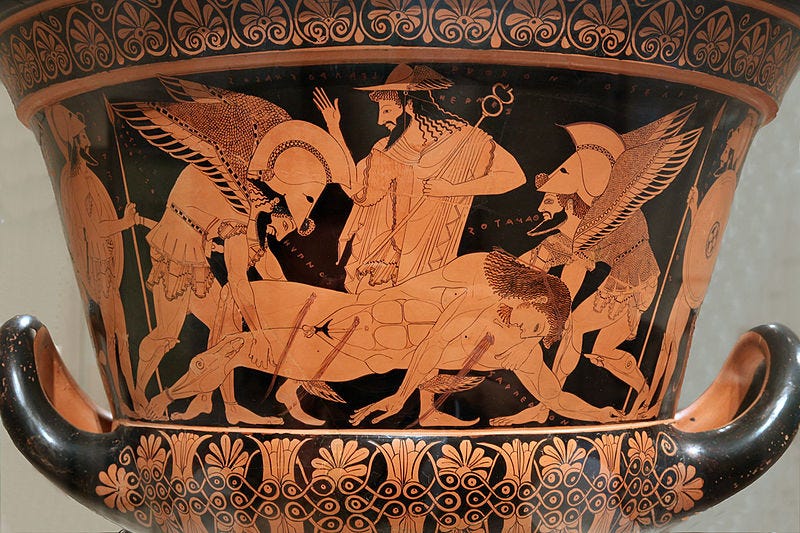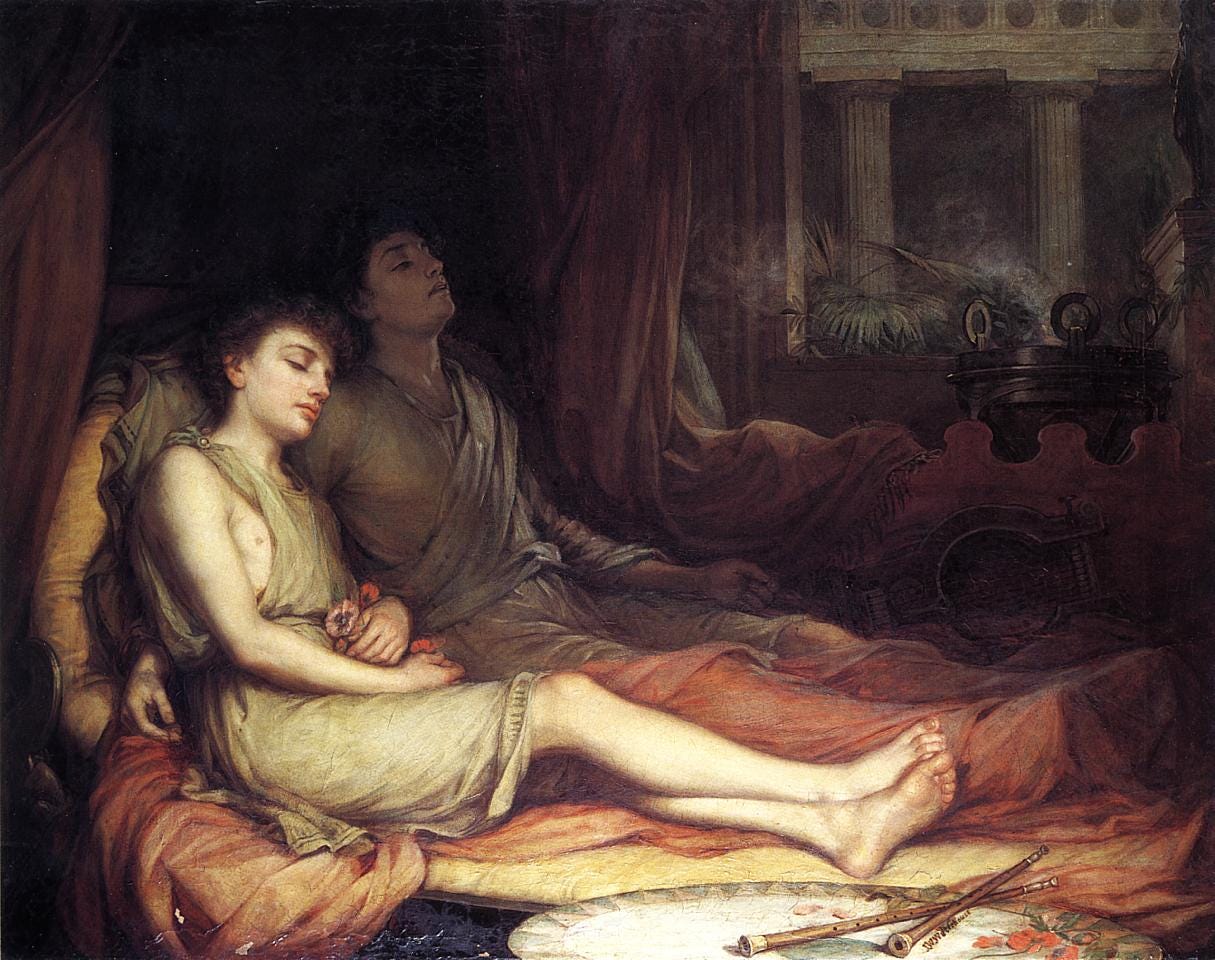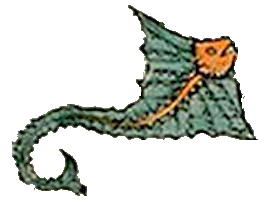Our Intuitions About Non-Existence Are Pretty Terrible
Oblivion is a shoddy foundation for philosophical takes 0️⃣
The concept of the zero seems pretty basic to us moderns, but its history is complex. The Egyptians had a symbol for something close to it: “𓄤”. This hieroglyph is called “heart with trachea,” makes the sound “nfr” or “nefer,” and means “beautiful,” “good,” or “pleasant.” It was used to mark the zero level of monuments.
(In emoji I guess the closest would be: 🫀🫁)
But “𓄤” wasn’t really used as a number, and furthermore, other civilizations didn’t even have a base level marker like this. The Babylonians, from whom much of our math is derived, sort of had a zero as a placeholder (in fact, just a gap in large numbers), but no individual zero symbol. The Greeks had neither an individual symbol nor a placeholder, and, in typical Greek fashion, argued endlessly around philosophical questions like “can not being be?” The Romans, the Maya, the Indians, the Chinese, and other cultures all struggled with the notion of nothingness in their own way, until eventually everyone agreed that it was practical to define nothingness as a number like the others, because it allowed some useful operations.
That notion originally entered the Western world from India via the Arabs. They wrote it as a circle and called it صفر , ṣifr, which means “empty.” In Italian, ṣifr became zefiro; in Venetian, zevero; in contracted form, zero.
Meanwhile, the numbers 1, 2, 3, 4, etc., whether they were written I, II, III, IV or 一, 二, 三, 四 or ٤,٣,٢,١, were completely uncontroversial. It’s funny, isn’t it, how numbers that feel so mathematically close as 0 and 1 could be conceptually so far apart for thousands of years.
Today, except when someone like Peter Thiel draws upon that deep lore to write a book such as Zero to One, the concept of zero has become entirely mundane. It is a number just like any other. A tool for our mathematical convenience.
In philosophy, the equivalent to inventing the zero is to invent arguments that involve non-existence.
Like the zero, the conceptualization of non-existence took a while, in the grand scheme of things. Most animals — including almost all of our evolutionary ancestors — probably have no awareness of their own existence and mortality. Even after humans started to perform such things as funerary rites, it seems that our natural tendency has been to come up with stories of the afterlife (the underworld, heaven and hell, reincarnation) and beforelife (such as the Jewish Tree of Souls, Mormon preexistence, and reincarnation). It is uncomfortable to think about eternal oblivion. So we haven’t been thinking about it much.
Eventually, though, eternal oblivion won out. I don’t mean to say that everyone believes in it, exactly — belief in an afterlife is quite popular. Yet we don’t really act, and define our morals, as if there were any kind of afterlife or beforelife. Even religious people don’t rejoice when a relative dies, even if that relative, assuming they were virtuous, is supposed to be headed to heaven where they will experience everlasting bliss. I suspect that most of us, even if we don’t like the idea of eternal oblivion, consider it, fundamentally, to be likely true.
And so non-existence has become a mundane concept. A tool for our philosophical convenience.
The zero allows mathematicians to write numbers in a better way (e.g. 208 instead of CCVIII), conceptualize negative numbers, and perform a variety of operations. What does non-existence allow philosophers to do?
In typical philosopher fashion, it allows them to ask a bunch of questions. For example:
Natalism and antinatalism. Since people can’t consent to being born, is it ethical to force existence onto a new person?
Suicide. Is it acceptable to cause oneself to not exist?
Animal farming. Would it be better for factory-farmed animals to never exist in the first place?
Without a concept of non-existence, these questions sit on a spectrum from difficult to illogical. Why be concerned about the ethics of slaughtering a chicken if all it does is move a chicken soul from Earth to Chicken Heaven? It would be like trying to subtract 5 from 3 without a concept of negative numbers.
Yet they’re interesting questions. We can’t avoid them: having kids, dealing with suicidal people and picking a diet all require individuals and society to decide on a course of action. So we debate them. We try to come up with new arguments. And then, someday, a clever philosopher realizes that we can use the “philosophical zero” and expand the range of possible operations. The real case for antinatalism, then, isn’t that children impose a high environmental cost or whatever: it’s that they can’t consent to existing.
The problem is, I’m not sure that such arguments are actually helping all that much. They might even make things worse.
The fatal flaw of non-existence, at the risk of sounding obvious, is that we can’t experience it. Not only that: we can’t even imagine a theoretical situation in which someone experiences it. Non-existence breaks the very concept of experience.
Anything that breaks the very concept of experience is hard to think about. An example is asking what was before the Big Bang. This is a meaningless question, because (at least according to some cosmological models) time literally started at the Big Bang, so there is no “before” the Big Bang. But we can’t think outside of time. The result is that any attempts at describing time around the Big Bang are extremely counterintuitive.
Similarly, we can’t imagine what not existing feels like, because feelings are a part of existence. If you could experience non-existence, it wouldn’t be non-existence.
But since we’re sophisticated thinkers and want to use the “philosophical zero” in our sophisticated arguments, we need to figure out a way to think about non-existence nonetheless. And how do we usually manage to think about impossible things? By using analogies.
What is a thing that we do experience and seems roughly similar to not existing?
That’s easy: sleep! When we sleep, we’re unconscious, at least when we don’t dream. And unconsciousness, i.e. the lack of a conscious experience, seems like the closest analogue to not existing. Indeed the similarity between sleep and death has been recognized just about forever; in Greek myth, they were the brothers Hypnos and Thanatos, sons of the Night.

The danger with any analogy is to stretch it too far. As it turns out, with sleep and death, you really don’t need to stretch far at all to start causing problems.
Sleep, you see, is nice. It cures tiredness. It is typically done in a comfortable setting. It is restful, quiet, peaceful, energizing — all adjectives with positive connotations. I wouldn’t be surprised if the Egyptians used the hieroglyph 𓄤 to describe sleep as pleasant. From there, it’s pretty easy to imagine death as also confortable and quiet. And indeed we typically describe death as “eternal rest”; the stereotypical Halloween tombstone is adorned with the inscription “R.I.P.“ — requiescat in pace, rest in peace.
But surely you can see the problem. We don’t actually experience rest or peace or any of those feelings while we sleep. We experience them right before falling asleep, or when we wake up. During dreamless sleep, we’re unconscious, and unconsciousness is another one of those things that break the very concept of experience.
The dead aren’t resting. Neither are the unborn. It doesn’t feel nice to be dead or unborn. It doesn’t feel bad, either. It doesn’t feel, period.
I suspect the analogy with sleep, and its extension to death, to be at the source of a whole lot of bad philosophical takes around non-existence.
Specifically, I suspect it is flatly nonsensical to “prefer to have never been born” or “prefer to be dead.” Sure, you can say these sentences and even believe them. But the reason you’re even allowed to say and believe them is that you were born and are alive. If you were unborn or dead, you wouldn’t be in the state of having your preferences satisfied. You wouldn’t be in a state of anything. You wouldn’t be, period.
Such preferences, therefore, can never be fulfilled. They are nonsensical.
If we revisit the questions above based on this conclusion, and assuming no afterlife or beforelife, we get:
Natalism and antinatalism. Can people consent to be born? Neither yes nor no: it is a nonsensical question. They cannot consent, but neither does it make sense to say they don’t consent. People have to be born first to have any opinion on the matter. The decision to have children or not should rest on other reasons.
Suicide. Is it acceptable to cause oneself to not exist? I’m personally undecided on whether there may be a kind of pain that is truly unbearable to the extent that death is preferable. Maybe there is. But I think it’s important to realize that while suicide may end the pain, it will not make you feel the end of the pain. You won’t feel relieved, soothed, unburdened, or anything like that. So overall I’m pretty strongly against suicide: it’s based on a nonsensical premise. (Of course, depressed people may, tragically, be particularly susceptible to nonsensical premises.)
Animal farming. Would it be better for factory-farmed animals to never exist in the first place? Let’s remind ourselves that not eating meat won’t lead to a thriving population of happy pigs and chickens, but rather to the non-existence of almost all pigs and chickens. Would that be better? Opponents of factory farming say yes: pig and chicken lives are so painful that they’d choose to never be born, if such a choice could be made. But such a choice literally cannot be made. It’s nonsensical. We can still be opposed to factory farming, but it has to be based on other reasons (and bite the bullet that it will lead to a mass extinction of farm animals).
Many of you, reading this, probably instinctively disagree. I say this because I’m basing of the above — especially the natalism and animal farming parts — on arguments that I commonly see from smart people. It doesn’t feel nonsensical to use such arguments. It feels perfectly natural, just like it feels natural to use a symbol for nothingness in math.
But I’m here to say: your intuitions about non-existence, like mine, are pretty terrible. They rest upon faulty analogies. We shouldn’t trust them too much. So, disagree if you want, but be careful if you do.
Several months ago, when I wrote a post arguing an adjacent point, I also used a mathematical analogy. I said that the purest form of evil is emptiness, but that we were confused about this because of negative numbers.
Negative numbers, just like zero, are an abstraction. They don’t correspond to something real and concrete. You can’t see a negative number of things; you can’t see zero things. But almost everyone in today’s world is trained in basic arithmetic, so almost everyone constantly forgets that negative numbers and zero are just tools we created for our convenience. And to be clear, it’s been totally worth it! Yet, like any technology, they change our thinking, sometimes in ways that become hard to see.
So it goes with philosophy. It’s convenient, and useful, to construct arguments based on something as abstract and un-experienceable as non-existence. But it can confuse us. We have to be careful.
In the end, maybe the Greeks were right to be wary of the zero. Can not being be? Perhaps, perhaps not. But whatever your answer is, don’t be too confident about the solidity of whatever philosophy you build on top of it.












There's a sense in which the preference for experiencing death doesn't make sense. An actual person cannot experience death.
But the preference to die (or not) seems coherent. Actual people die. So one can make meaningful claims about whether it's good to die or not. Because of this we can meaningfully talk about the goodness / badness of killing selves or others.
The goodness or badness of dying is largely instrumental. Living is instrumentally necessary for most good and bad things in the world.
I think a better analogy than sleep is general anaesthesia. In my experience, “after-sleep” has a felt continuity with “before-sleep”; general anaesthesia, on the other hand, seems to be completely discontinuous. One completely disappears, and then re-appears. It’s not an “experience” of non-existence, but it _is a pretty visceral experience of the boggling impossibility of comprehending non-existence. Well, it boggles me, anyway.